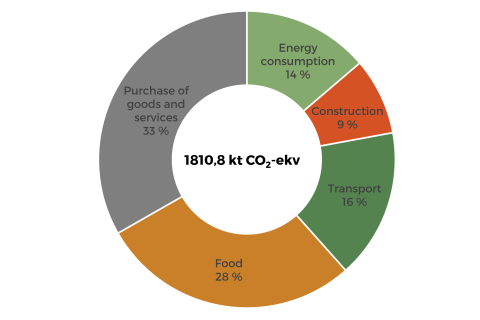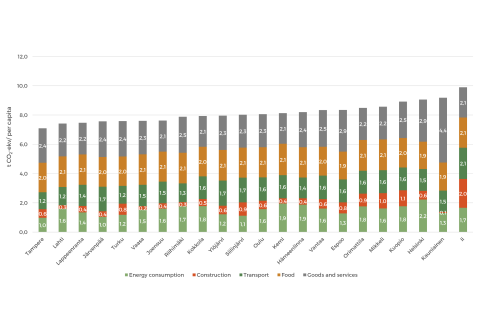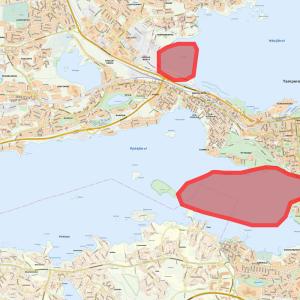Per capita climate emissions from consumption in Tampere have decreased – now the lowest in Finland
For the third time, Tampere calculated the climate emissions, or carbon footprint, of its residents' consumption. The carbon footprint is lower than in the previous survey two years ago. Consumption of goods and services and food are the main sources of emissions. The survey covered 22 municipalities.
The carbon footprint of consumption consists of energy consumption, construction, transport, food and the purchase of goods and services. The total greenhouse gas emissions from consumption in Tampere in 2024 were 7.1 tonnes of carbon dioxide equivalent (CO2e) per capita.
The consumption-based emissions of Tampere residents have previously been calculated for 2020 and 2022. From 2022 to 2024, the carbon footprint decreased by almost a tenth. In the first calculation (2020), the carbon footprint was 7.7 tonnes CO2e per capita and in the second (2022) 7.8 tonnes CO2e.
The total carbon footprint of consumption in Tampere in 2024 was 1810.8 kilotonnes CO2e.
The consumption of goods and services is the biggest emitter in Tampere
The carbon footprint of Tampere residents' consumption was calculated by Sitowise Oy and the Natural Resources Institute Finland using the Kulma model.
In Tampere, the consumption of goods and services is the biggest emitter, accounting for about one third (33%), while food consumption accounts for just under one third (28%). The next largest emitters are transport, energy consumption and construction.

Compared to the 2022 calculations, the biggest change is in energy consumption. When Tampereen Energia produces district heating with less emissions, it will reduce the total emissions from the consumption of residents. In 2022, Tampere's total consumption emissions were 1902.1 kilotonnes CO2e.
– It is great that the emissions from consumption have decreased. Every day we make hundreds of different consumption decisions that can affect these very emissions. As more and more people make more sustainable choices in their everyday lives, the combined effect is significant," says Tiina Leinonen, Programme Manager of the City of Tampere's strategic Carbon Neutral Actions development programme.
The easiest and cheapest choice is not to buy things you don't necessarily need. For example, you can often rent or borrow a tool or less common hobby equipment instead of buying it. When you maintain and repair your clothes or goods, they last longer.
– Switching to an everyday diet rich in domestic fish and vegetables that meets nutritional recommendations not only improves health and well-being, but also reduces climate emissions from food by up to a third, Leinonen adds.
Per capita climate emissions from consumption in Tampere are the lowest in the calculation
Tampere has the smallest per capita carbon footprint of the municipalities of different sizes and population sizes included in the calculation. The emissions of the municipalities participating in the Kulma project ranged from 7.1 tonnes to 9.9 tonnes per capita in 2024.
22 municipalities participated in the project, including the largest cities such as Helsinki, Espoo, Vantaa, Turku and Oulu. Tampere has the lowest per capita emissions.

There is still a long way to go to a sustainable level. The Paris Agreement aims to limit global warming to 1.5 degrees by the end of the century. To reach this target, per capita emissions should reach 2.5 tonnes of carbon dioxide equivalent by 2030 and fall to 0.7 tonnes by 2050.
The calculation of emissions will be refined
Sitowise Ltd and the Natural Resources Institute Finland are developing the Kulma calculation one step at a time. This time, the calculation was refined for household consumption. The results of the calculation reinforce the idea that everyday household choices are important for climate change mitigation.
The consumption-based calculation of greenhouse gas emissions takes into account all emissions from municipal consumption, regardless of where the consumed goods are produced. Regional accounting, on the other hand, covers emissions mainly generated within the municipality, emissions from energy and waste management, and emissions from agriculture and manufacturing, regardless of where the products are consumed.



